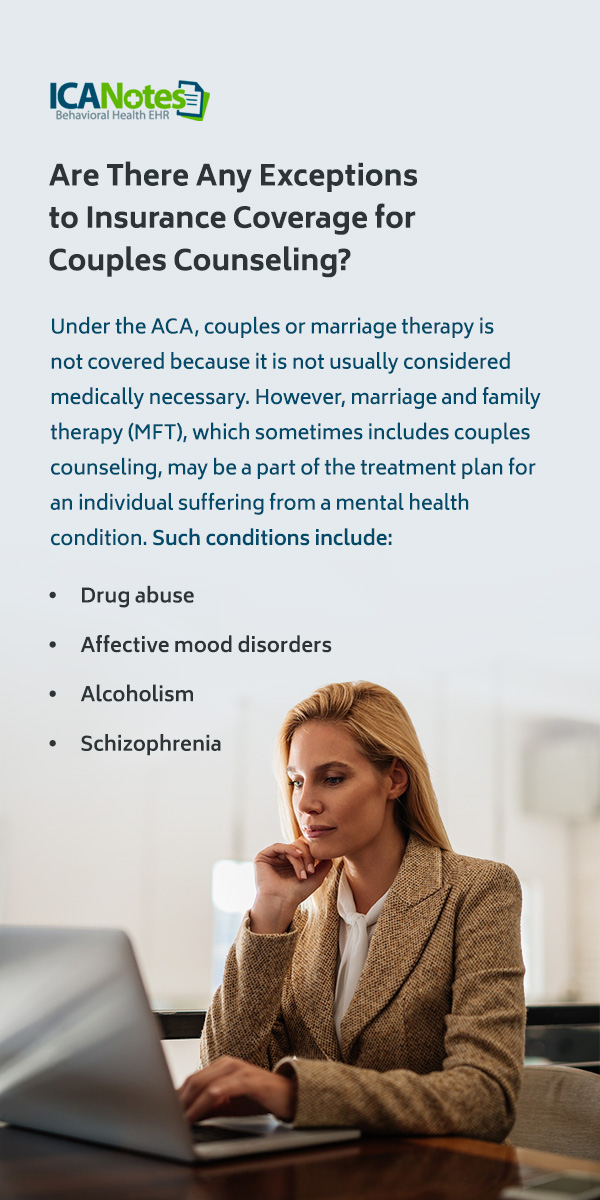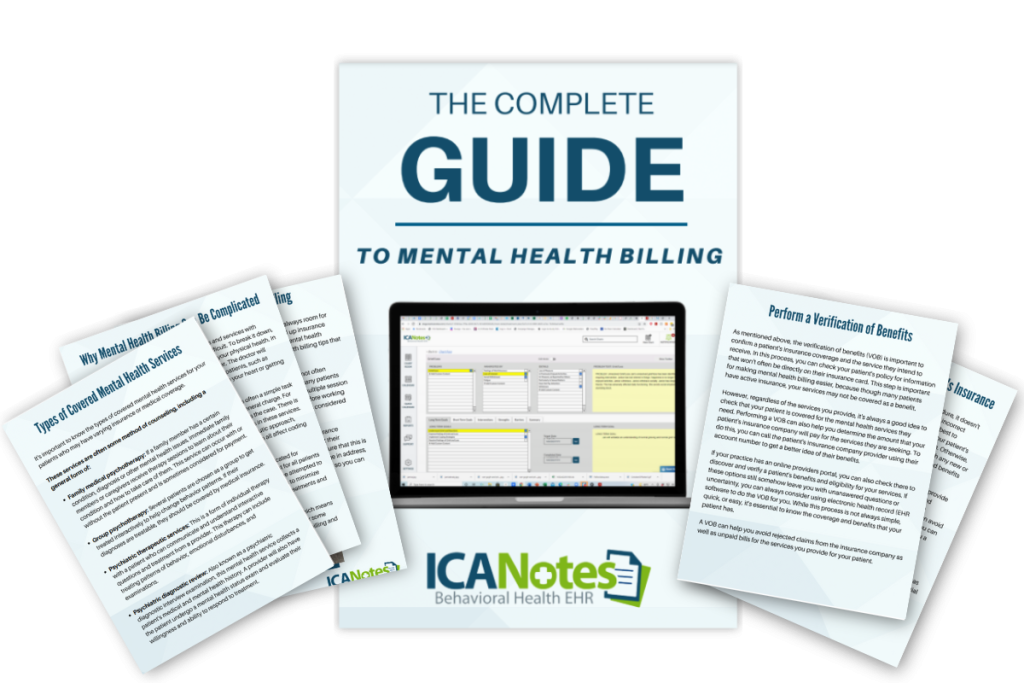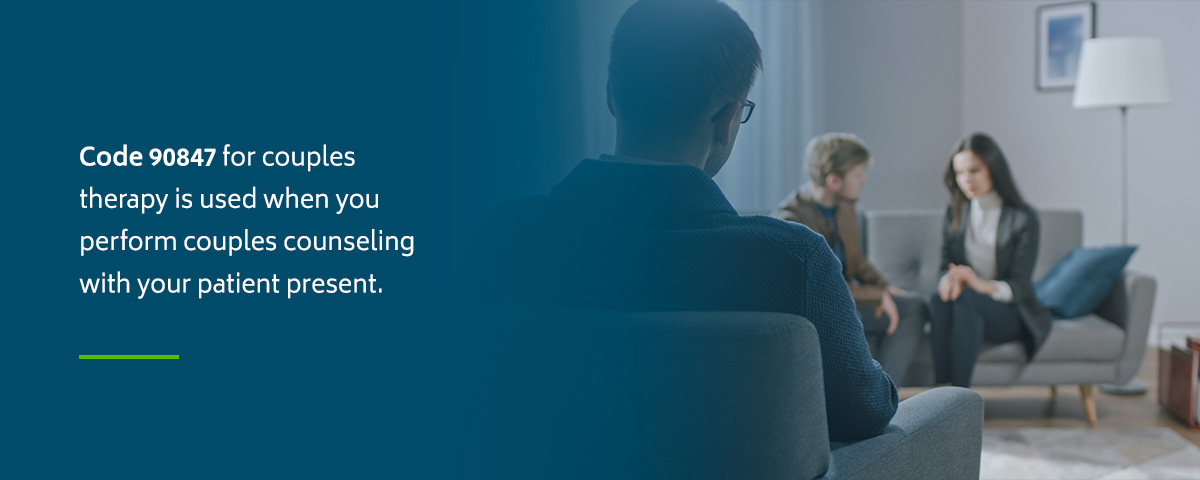
How to Bill Insurance for Couples Therapy with CPT Codes
As a behavioral health professional, you may have many patients coming to you for couples or marriage counseling. In some cases, your individual patients may see you for treatment and inquire about bringing in their partner for family sessions. While relationship strain can certainly contribute to someone's progress in individual therapy, it's not always covered by insurance.
This can make it a difficult and sometimes awkward process when your patient discovers they may have to pay a co-pay or even out-of-pocket for couples therapy sessions. As a therapist, however, it can be tricky to figure out how to get reimbursed while avoiding insurance fraud. In this guide, we'll help you learn how to bill insurance for couples therapy while being mindful of the law and your license requirements.
Can You Bill Insurance for Couples Therapy?
The short answer is yes, you can bill insurance companies using a CPT code for couples therapy. The long answer is that not all insurance companies will cover this type of therapy‚ which we'll get into below. However, you can bill insurance for marriage and couples therapy using Current Procedural Terminology (CPT) codes. As a clinician, you're likely very familiar with the use of CPT codes, as you have to use them to identify the services you provide for each patient in order to get reimbursed by insurance companies.
Is Couples Therapy Covered by Insurance?
Couples therapy, also known as marriage counseling or family therapy, is not always covered by insurance or third-party payers. In many cases, these services are specifically excluded from benefits coverage. Under certain laws like the Mental Health Parity and Addiction Equity Act (MHPAEA) and the Affordable Care Act (ACA), treatment for mental health conditions must be covered by insurance to a certain degree.
The MHPAEA set new standards for mental health care by allowing mental health conditions to be treated like physical conditions, which means they cannot be excluded from insurance coverage. The MHPAEA also prevents insurers from charging higher co-pays for mental health treatment than they would for physical health treatment.
Unfortunately, these laws do not generally apply to couples or marriage counseling. The MHPAEA protects mental health treatment by equating mental health conditions to a medical diagnosis. However, a couple needing relationship counseling is not seen as a medical necessity or diagnosis, so it's not considered equal to physical health issues.
So, while a patient seeking treatment with you for their anxiety, depression or substance abuse issues would likely be covered, a session in which they bring in their spouse or partner may not be.
In some cases, therapists sidestep the limits of an insurance plan by billing for an individual session instead of a couple's session, such as treating one person while the partner is there to help the individual with their mental health challenge. However, this is insurance fraud, which is a federal crime. While many behavioral health professionals are eager to help patients in need, using an individual insurance plan to cover marriage or couples counseling when it is not covered under that plan is completely illegal.
As a mental health practitioner, it's critical to verify coverage before you provide any services for an individual, couple, or family. Even if coverage exists, the patient may have to meet certain criteria, such as providing evidence to prove that couples therapy is medically necessary to treat an individual's diagnosis.
Are There Any Exceptions to Insurance Coverage for Couples Counseling?
While couples therapy is not covered under most standard health insurance plans, certain plans may cover some types of treatment for couples and families. Keep in mind that you should always double-check your state's laws and policies and practice if you're unsure about whether a service would be covered for your clients.
For instance, insurers might be required to cover counseling for a couple if their need for treatment directly results from a mental health condition. Let's say one of your patients has a sex addiction that has been significantly affecting their marriage. Even in this case, it can be difficult to get insurance coverage, but some plans may cover it if documentation supports the need for counseling.
Some insurance plans also offer couples counseling as an additional benefit, but this usually means the couple has to choose from a pre-approved list of providers. Alternatively, couples counseling could be covered under certain plans as long as they meet a deductible to obtain coverage. In some cases, your clients may have to apply for reimbursement themselves instead of paying a co-pay for their session.
Certain Employee Assistance Programs (EAPs) may offer to cover a portion of the costs of couples counseling. Many employers offer this benefit because such treatment often improves productivity and reduces absenteeism. These types of plans may only offer this coverage if the marriage problems are due to individual conditions like addiction or depression.
Under the ACA, couples or marriage therapy is not covered because it is not usually considered medically necessary. A medical necessity generally requires health services to treat

illnesses, injuries, diseases, and conditions. However, marriage and family therapy (MFT), which sometimes includes couples counseling, maybe a part of the treatment plan for an individual suffering from a mental health condition. Such conditions include:
- Drug abuse
- Alcoholism
- Affective mood disorders
- Schizophrenia
ACA health insurance plans may require an insurer to provide coverage if an individual experiences one of these conditions and requires couples therapy as a direct result. Though, most of the time, it will not be covered. Medicare Part B will sometimes cover family counseling if the purpose of treatment is to help improve an individual's condition, but these plans have certain restrictions, such as the type of behavioral healthcare provider they can see.
FREE DOWNLOAD - The Complete Guide to Mental Health Billing


How do I use a CPT Code for Couples Therapy correctly?
If you're familiar with CPT codes, then you may have seen codes that practitioners use for couples counseling. CPT code 90847 for couples therapy is used when you perform couples counseling with your patient present. This code is an essential tool for mental health clinicians because it lets you effectively bill insurance companies for therapy sessions involving multiple individuals.
Of course, depending on the patient's plan, this session may only be covered partially or not at all. In cases when your services will at least be partially covered, such as during couples therapy that is required to help an individual patient with a mental health condition, you can use this CPT code for couples therapy.
Keep in mind, though, that code 90847 can only be used when your patient is present during these ongoing couples therapy sessions. This is called a conjoint psychotherapy session. You may use code 90847 on the same day as your individual psychotherapy service with your patient as long as the services are performed separately. If your patient is not present during a couples or family session, you must use code 90846. Likewise, you cannot use the couples therapy CPT code 90847 at all if you're performing an individual therapy session for your patient.
For those with Medicare, the minimum required time for couples therapy, whether or not the patient is present, is at least 50 minutes.
When using CPT code 90847, your session must be at least 26 minutes in length. While there is generally no maximum length for couples or family service, it's recommended you wait until at least 74 minutes of service before using add-on billing codes for additional time. In this case, you can use code 99354 to bill an extra 30 minutes of service time when using codes 90846 and 90847. Additionally, as 90847 is considered one service code, and you can never bill both clients.
To make this process easier, it's important to determine your identified patient (IP) before you begin couples or marriage counseling. For instance, suppose your patient Becky has been coming to therapy with you for several months with severe depression. Under her health insurance plan, couples counseling is covered due to her condition affecting her marriage. In this case, her spouse may join her in her sessions, but she would be listed as your IP because she was your initial patient.
If both individuals within the couple have mental health diagnoses, you may choose the person with the more severe symptoms or the one who is the primary holder of their insurance if they are married. When creating your invoice and claim, be sure to put the name of your IP on your documentation and their diagnosis.
If you're seeing your IP for an individual session without their spouse, you would use their individual therapy code. If you're seeing the spouse without your IP, this is when you would use code 90846, which is the couples therapy billing code for when the IP is not present.
As for the length of your session, here are the individual therapy codes you should use when meeting with the IP:
- CPT Code 90834 for individual therapy lasting 45 minutes
- CPT Code 90837 for individual therapy lasting 60 minutes
Using the correct CPT code for couples counseling is crucial to ensure you are reimbursed fairly and accurately for your services, so be sure to double-check that you are using the right ones.
FAQs and Considerations When Billing for Couples Therapy
Navigating billing and CPT codes for couples therapy can be a challenge. As with providing any service, complications can arise if you use the wrong code, enter incorrect information, or leave required fields blank when submitting your claim for reimbursement. To help you stay organized and informed, here are some couples counseling billing tips and FAQs to keep in mind.

1. Why Can I Not Bill Separately to Each Person's Insurance Plan?
When you bill each person separately for a combined service such as couples therapy, this is known as double billing, which is insurance fraud. Charging twice for the same reason could result in you losing your license. In fact, any deliberate misuse of coding on your insurance claims for reimbursement, including up-coding for an individual's therapy service, is illegal.
2. What Do I Do When a Patient Is Covered Under Multiple Insurance Policies?
Sometimes, the IP may be covered by two insurance plans. This tricky situation usually occurs when an IP is covered by their own plan and their spouse's. You cannot bill both plans for a full couples therapy session or even for two individual sessions, as this is also fraudulent and puts you at risk. To clear up any confusion, it's best to contact both insurance plans and determine which one is primary and bill that plan.
3. Will Insurance Cover a Patient for Couples Therapy If They Are Also in Individual Therapy?
A patient having coverage for individual therapy does not automatically mean they will qualify for couples counseling coverage, even if they have a clinical mental health diagnosis. If couples or marriage counseling is something you believe would be beneficial for your IP, you may need to defend why they need both types of treatment. This could include providing treatment plans, therapy notes, and other documentation that clearly shows your patient's diagnosis and medical need for couples therapy.
4. How Do I Prevent Unintentionally Miscoding on My Claims?
Regardless of the situation, if you're in doubt about which code to use for your patients, be sure to verify their insurance plan or reach out to their insurance company for confirmation. This can avoid any issues in the future and keep your documentation up-to-date and organized. Seeing several or even dozens of clients a week can be time-consuming, so it's best to use software that can help you stay compliant with billing and documentation for convenience and efficiency.
Electronic health record (EHR) software can eliminate the burden of tedious, manual tasks like documentation and make the billing and reimbursement process more efficient. Instead of researching the correct CPT codes to use for every single patient, behavioral health software provides automatic coding to ensure you have supporting documentation for your billing claims and maximize your reimbursement.
See How ICANotes Improves Billing Documentation
Using the correct codes for billing is critical for all your patients. As a practitioner, your clinical documentation also plays a key role in insurance reimbursements. If your therapy notes are disorganized, illegible or simply not meeting regulatory scrutiny, it may be time to switch to a better solution. At ICANotes, it's our goal to help behavioral health professionals like you speed up documentation and get reimbursed faster.
Instead of spending hours creating documentation and looking up the correct codes for every patient, our premier EHR makes it easy to create therapy note templates and keep your notes up to date. Our intuitive software also generates the codes that will help you get the highest possible reimbursement supported by your documentation.
Start Your Free Trial Today


